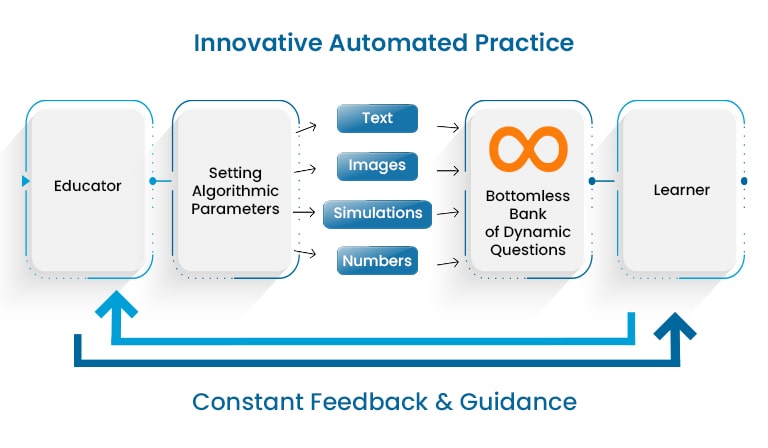Achieving Enhanced Learning: The Impact of Automated Practice
The proverb “Practice makes perfect” emphasizes that achieving excellence in any domain, be it sports, arts, or life skills, demands dedicated and rigorous practice. Successful individuals in any field will attest to the countless hours they’ve devoted to refining their abilities. The same principle applies to academics: while understanding concepts is crucial, reinforcing them through practical application improves knowledge retention and creates an enhanced learning ecosystem over an extended period.
Educators at every educational tier emphasize the importance of regular practice. This serves a dual purpose: refining comprehension by identifying and rectifying errors while also serving as a valuable self-assessment tool to gauge progress and enhance learning outcomes. This approach helps dispel the “Illusion of Knowing,” a common pitfall where students mistakenly assume they understand a subject immediately after a class, only to struggle when revisiting it later.
Prioritizing the quality of practice over its quantity tends to yield superior results. This emphasis on quality encourages a vigilant approach to learning methods, ensuring correctness. It fosters the cultivation of problem-solving skills, constructive habits, and more efficient skill development. In contrast, striving for a sheer volume of practice while neglecting its quality may lead to detrimental habits and hard-to-fix mistakes. A focus on practice quality ensures effective and enhanced learning.
Practice yields numerous advantages for students in their learning journey:
1. Elevated Performance: Regular practice cultivates proficiency, leading to enhanced performance in exams and assessments.
2. Enhanced Confidence: Proficiency gained through practice fosters self-assuredness, empowering students to tackle new challenges with ease.
3. Sharpened Problem-Solving: Practice hones problem-solving skills among learners, enabling them to find solutions to challenges independently.
4. Improved Retention: Consistent practice reinforces memory, aiding long-term retention, crucial for exam and assessment readiness.
5. Time Management Skills: Regular practice instills effective time management and prioritization skills, benefiting both academics and personal life.
Now, the main question arises: How can students incorporate more practice questions into their hectic schedules? Where can they access high-quality practice materials? And who will provide them with the correct explanation and feedback?
Leveraging technology-enabled learning, instructors can now foster a superior and highly innovative learning environment centered on practice through digital assessments. It’s crucial to emphasize that the instructor should directly guide “what to practice,” ensuring adherence to quality standards and optimizing practice effectiveness.
Here are some key elements that can assist educators in fostering a practice-centered learning experience for students:
1. Automated Digital Question Generation: Utilizing digital tools to automatically generate variations of questions by altering parameters such as text, numbers, or images. This not only saves instructors time but also provides students with an endless self-evaluation method.

2. Immediate Question Feedback: Beyond attempting practice questions, learners benefit from instant feedback. In an ideal scenario, they should be able to check the correctness of their answers and access guided solutions independently, facilitating error identification.
3. Flexible Learning Environment: With information readily accessible at any time, students should have the flexibility to determine when and how they engage with practice materials. This technology-enabled learning atmosphere allows students to complete practice sessions in multiple sittings, aligning with their schedules.
4. Fostering Self-Learning Skills: Practice should encourage students to independently seek and evaluate information, fostering critical thinking and the formation of their own opinions and perspectives. This approach enhances self-learning skills, enabling students to become more self-directed and independent learners.
In conclusion, increasing practice with a variety of questions or problems can significantly enhance learning outcomes and comprehension of a subject. This approach allows for a deeper understanding of the material and the cultivation of robust problem-solving skills. Moreover, extensive practice exposes you to various question types, enabling the development of effective learning strategies. However, it is paramount to prioritize the quality of practice over sheer quantity. Focused and deliberate practice yields superior results compared to hasty and mindless repetition.
The interactive Möbius platform is a product of DigitalEd India, an EdTech company with a resonant purpose: Simplifying STEM education for teachers and students across the globe.
Möbius offers an innovative method that combines digital assessment, self-evaluation, and automated practice to foster an enhanced learning environment:
Algorithmically Randomized Questions – Limitless Questions, Infinite Possibilities
This feature helps you to empower your learners with a secure self-assessment pathway that enables them to leverage a bottomless bank of dynamic questions based on pre-defined and customizable algorithmic parameters.
Want to explore deeper? Book a personalized product demo today!
Author
Deepali Singh